
List of Greek phrases
Encyclopedia
List of Classical Greek
Phrases/Proverbs

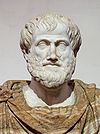

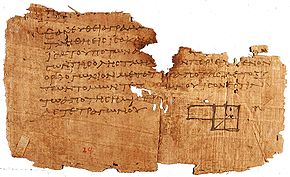
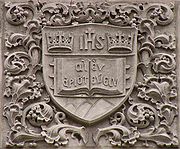
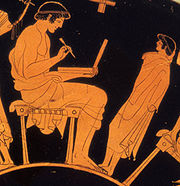
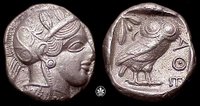
.
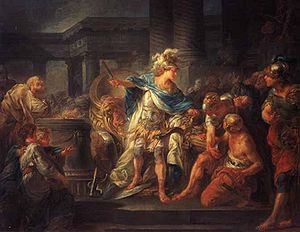

_with_a_snake_in_kinnarsani_ws,_ap_w_img_6062.jpg)
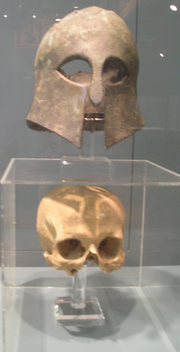
.svg.png)
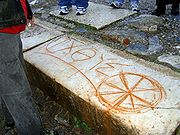

.
.
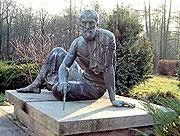 .
.
.
.
.
.
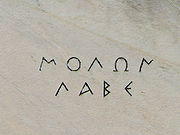
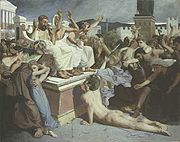
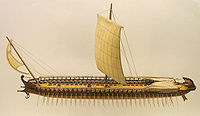
(ΟΕΔ)
οὔ με πείσεις, κἂν με πείσῃς

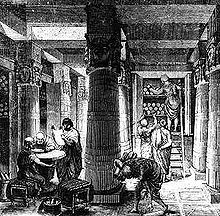 ψυχῆς ἰατρεῖον
ψυχῆς ἰατρεῖον
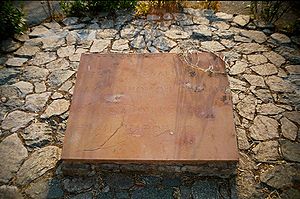
Greek language
Greek is an independent branch of the Indo-European family of languages. Native to the southern Balkans, it has the longest documented history of any Indo-European language, spanning 34 centuries of written records. Its writing system has been the Greek alphabet for the majority of its history;...
Phrases/Proverbs
| Contents |
|---|
|
Αα
(h)a
- Ageōmétrētos mēdeìs eisítō.
- "Let no one untrained in geometryGeometryGeometry arose as the field of knowledge dealing with spatial relationships. Geometry was one of the two fields of pre-modern mathematics, the other being the study of numbers ....
enter." - Motto over the entrance to Plato's AcademyPlatonic AcademyThe Academy was founded by Plato in ca. 387 BC in Athens. Aristotle studied there for twenty years before founding his own school, the Lyceum. The Academy persisted throughout the Hellenistic period as a skeptical school, until coming to an end after the death of Philo of Larissa in 83 BC...
(quoted in Elias' commentary on Aristotle's Categories).

- Aeì Libýē phérei ti kakón / kainón.
- "Libya always bears something evil / new", AristotleAristotleAristotle was a Greek philosopher and polymath, a student of Plato and teacher of Alexander the Great. His writings cover many subjects, including physics, metaphysics, poetry, theater, music, logic, rhetoric, linguistics, politics, government, ethics, biology, and zoology...
, Historia AnimaliumHistory of AnimalsHistory of Animals is a zoological natural history text by Aristotle.-Arabic translation:The Arabic translation of Historia Animalium comprises treatises 1-10 of the Kitāb al-Hayawān .-See also:...
. - Compare LatinLatinLatin is an Italic language originally spoken in Latium and Ancient Rome. It, along with most European languages, is a descendant of the ancient Proto-Indo-European language. Although it is considered a dead language, a number of scholars and members of the Christian clergy speak it fluently, and...
Ex Africa semper aliquid novi "From Africa always something new", PlinyPliny the ElderGaius Plinius Secundus , better known as Pliny the Elder, was a Roman author, naturalist, and natural philosopher, as well as naval and army commander of the early Roman Empire, and personal friend of the emperor Vespasian...
.

- Aeì koloiòs parà koloiôi hizánei.
- "A jackdawJackdawThe Jackdaw , sometimes known as the Eurasian Jackdaw, European Jackdaw or Western Jackdaw, is a passerine bird in the crow family. Found across Europe, western Asia and North Africa, it is mostly sedentary, although northern and eastern populations migrate south in winter. Four subspecies are...
is always found near a jackdaw" - Similar to English "birds of a feather flock together."

- Aei ho theos geōmetreî.
- "God always geometrizes", PlatoPlatoPlato , was a Classical Greek philosopher, mathematician, student of Socrates, writer of philosophical dialogues, and founder of the Academy in Athens, the first institution of higher learning in the Western world. Along with his mentor, Socrates, and his student, Aristotle, Plato helped to lay the...
- PlutarchPlutarchPlutarch then named, on his becoming a Roman citizen, Lucius Mestrius Plutarchus , c. 46 – 120 AD, was a Greek historian, biographer, essayist, and Middle Platonist known primarily for his Parallel Lives and Moralia...
elaborated on this phrase in his essay Πῶς Πλάτων ἔλεγε τὸν θεὸν ἀεί γεωμετρεῖν "What is Plato’s meaning when he says that god always applies geometry". Based on the above phrase of Plato, a present day mnemonic for π (pi)Pi' is a mathematical constant that is the ratio of any circle's circumference to its diameter. is approximately equal to 3.14. Many formulae in mathematics, science, and engineering involve , which makes it one of the most important mathematical constants...
was derived: - Aeì ho theòs ho mégas geōmetreî tò sýmpan.
- "Always the great God applies geometry to everything"
| ἀεὶ | ὁ | θεὸς | ὁ | μέγας | γεωμετρεῖ | τὸ | σύμπαν |
|---|---|---|---|---|---|---|---|
| 3 letters | 1 letter | 4 letters | 1 letter | 5 letters | 9 letters | 2 letters | 6 letters |
- Aetoû gêras, korydoû neótēs.
- "An eagle's old age (is worth) a sparrow's youth".

- aièn aristeúein
- “Ever to ExcelEver to Excel"Ever to Excel" is the English translation of the Ancient Greek αἰὲν ἀριστεύειν . It has been used as motto by a number of different educational institutions.-History:...
“ - Motto of the University of St AndrewsUniversity of St AndrewsThe University of St Andrews, informally referred to as "St Andrews", is the oldest university in Scotland and the third oldest in the English-speaking world after Oxford and Cambridge. The university is situated in the town of St Andrews, Fife, on the east coast of Scotland. It was founded between...
(founded 1410), the Edinburgh AcademyEdinburgh AcademyThe Edinburgh Academy is an independent school which was opened in 1824. The original building, in Henderson Row on the northern fringe of the New Town of Edinburgh, Scotland, is now part of the Senior School...
(founded 1824), and Boston CollegeBoston CollegeBoston College is a private Jesuit research university located in the village of Chestnut Hill, Massachusetts, USA. The main campus is bisected by the border between the cities of Boston and Newton. It has 9,200 full-time undergraduates and 4,000 graduate students. Its name reflects its early...
(founded 1863). The source is the sixth book of Homer's IliadIliadThe Iliad is an epic poem in dactylic hexameters, traditionally attributed to Homer. Set during the Trojan War, the ten-year siege of the city of Troy by a coalition of Greek states, it tells of the battles and events during the weeks of a quarrel between King Agamemnon and the warrior Achilles...
, (Iliad 6. 208) in a speech GlaucusGlaucus (soldier)Glaucus was a son of Hippolochus and a grandson of Bellerophon. He was a captain in the Lycian army under the command of his close friend and cousin Sarpedon. The Lycians in the Trojan War were allies of Troy...
delivers to DiomedesDiomedesDiomedes or Diomed is a hero in Greek mythology, known for his participation in the Trojan War.He was born to Tydeus and Deipyle and later became King of Argos, succeeding his maternal grandfather, Adrastus. In Homer's Iliad Diomedes is regarded alongside Ajax as one of the best warriors of all...
: - "Hippolocus begat me. I claim to be his son, and he sent me to Troy with strict instructions: Ever to excel, to do better than others, and to bring glory to your forebears, who indeed were very great ... This is my ancestry; this is the blood I am proud to inherit."
- Anánkāi d'oudè theoì mákhontai.
- "Not even the gods fight necessity" — SimonidesSimonides of CeosSimonides of Ceos was a Greek lyric poet, born at Ioulis on Kea. The scholars of Hellenistic Alexandria included him in the canonical list of nine lyric poets, along with Bacchylides and Pindar...
, 8, 20.
- Andrôn gàr epiphanôn pâsa gê táphos.
- For illustrious men have the whole earth for their tomb. Pericles' Funeral OrationPericles' Funeral OrationPericles' Funeral Oration is a famous speech from Thucydides' History of the Peloponnesian War. The speech was delivered by Pericles, an eminent Athenian politician, at the end of the first year of the Peloponnesian War as a part of the annual public funeral for the war dead.-Background:It was an...
from ThucydidesThucydidesThucydides was a Greek historian and author from Alimos. His History of the Peloponnesian War recounts the 5th century BC war between Sparta and Athens to the year 411 BC...
, The Peloponnesian War 2.43.1
- Anerrhíphthō kýbos.
- Alea iacta estAlea iacta estAlea iacta est is a Latin phrase attributed by Suetonius to Julius Caesar on January 10, 49 BC as he led his army across the River Rubicon in Northern Italy...
. - Latin: "The die has been cast"; Greek: "Let the die be cast."
- Julius CaesarJulius CaesarGaius Julius Caesar was a Roman general and statesman and a distinguished writer of Latin prose. He played a critical role in the gradual transformation of the Roman Republic into the Roman Empire....
as reported by PlutarchPlutarchPlutarch then named, on his becoming a Roman citizen, Lucius Mestrius Plutarchus , c. 46 – 120 AD, was a Greek historian, biographer, essayist, and Middle Platonist known primarily for his Parallel Lives and Moralia...
, when he entered Italy with his army in 49 BC. Translated into LatinLatinLatin is an Italic language originally spoken in Latium and Ancient Rome. It, along with most European languages, is a descendant of the ancient Proto-Indo-European language. Although it is considered a dead language, a number of scholars and members of the Christian clergy speak it fluently, and...
by SuetoniusSuetoniusGaius Suetonius Tranquillus, commonly known as Suetonius , was a Roman historian belonging to the equestrian order in the early Imperial era....
as alea iacta estAlea iacta estAlea iacta est is a Latin phrase attributed by Suetonius to Julius Caesar on January 10, 49 BC as he led his army across the River Rubicon in Northern Italy...
.
- Ánthrōpos métron.
- "Man [is] the measure [of all things]"
- Motto of ProtagorasProtagorasProtagoras was a pre-Socratic Greek philosopher and is numbered as one of the sophists by Plato. In his dialogue Protagoras, Plato credits him with having invented the role of the professional sophist or teacher of virtue...
.
- Hápax legómenonHapax legomenonA hapax legomenon is a word which occurs only once within a context, either in the written record of an entire language, in the works of an author, or just in a single text. The term is sometimes used incorrectly to describe a word that occurs in just one of an author's works, even though it...
. - "Once said"
- A word that only occurs once.
- Apò mēkhanês Theós
- Deus ex machinaDeus ex machinaA deus ex machina is a plot device whereby a seemingly inextricable problem is suddenly and abruptly solved with the contrived and unexpected intervention of some new event, character, ability, or object.-Linguistic considerations:...
- "God from the machine"
- The phrase originates from the way god figures appeared in ancient Greek theaters, held high up by a machine, to solve a problem in the plot.
- Apò toû hēlíou metástēthi
- "Stand a little out of my sun"
- Legendary reply of Diogenes the Cynic when Alexander the Great asked him if he had any wish he desired to fulfil — version recounted by Plutarch
- Áriston mèn hýdōr.
- "Greatest however [is] water" — PindarPindarPindar , was an Ancient Greek lyric poet. Of the canonical nine lyric poets of ancient Greece, his work is the best preserved. Quintilian described him as "by far the greatest of the nine lyric poets, in virtue of his inspired magnificence, the beauty of his thoughts and figures, the rich...
, Olymp. 1, 1 - Used as the inscription over the Pump Room at Bath.
Ββ
b- Basileía tôn ouranôn
- "kingdom of the heavens"
- "HeavenHeavenHeaven, the Heavens or Seven Heavens, is a common religious cosmological or metaphysical term for the physical or transcendent place from which heavenly beings originate, are enthroned or inhabit...
" is a foundational theological concept in Christianity and Judaism. - "God's KingdomKingdom of GodThe Kingdom of God or Kingdom of Heaven is a foundational concept in the Abrahamic religions: Judaism, Christianity and Islam.The term "Kingdom of God" is found in all four canonical gospels and in the Pauline epistles...
" , or the "Kingdom of [the] Heaven[s]" was the main point of Jesus Christ's preaching on earth. The phrase occurs more than a hundred times in the New TestamentNew TestamentThe New Testament is the second major division of the Christian biblical canon, the first such division being the much longer Old Testament....
.

- Bellerophóntēs tà grámmata
- "Bellerophontic letter"
- King ProetusProetusProetus was a mythical king of Argos and Tiryns. His father Abas, son of the last surviving and died Danaid Hypermnestra, had ruled over Argos and married Ocalea. However, Proetus quarreled continually with his twin brother Acrisius, inventing shields or bucklers in the process...
dared not to kill a guest, so he sent BellerophonBellerophonBellerophon or Bellerophontes is a hero of Greek mythology. He was "the greatest hero and slayer of monsters, alongside of Cadmus and Perseus, before the days of Heracles", and his greatest feat was killing the Chimera, a monster that Homer depicted with a lion's head, a goat's body, and a...
to King IobatesIobatesIn Greek mythology, Iobates , a.k.a. Jobates, was a Lycian king, the father of Antea and Philonoe. Bellerophon was sent into exile to the land of King Iobates. Proetus, King of Tiryns, wanted Iobates to kill Bellerophon, but Iobates feared the wrath of the gods if he murdered a guest...
, his father-in-law, bearing a sealed message in a folded tablet: "Pray remove the bearer from this world: he attempted to violate my wife, your daughter."
- Brôma theôn
- "Food of the gods"
- Allegedly said by NeroNeroNero , was Roman Emperor from 54 to 68, and the last in the Julio-Claudian dynasty. Nero was adopted by his great-uncle Claudius to become his heir and successor, and succeeded to the throne in 54 following Claudius' death....
of the poisoned mushroomMushroomA mushroom is the fleshy, spore-bearing fruiting body of a fungus, typically produced above ground on soil or on its food source. The standard for the name "mushroom" is the cultivated white button mushroom, Agaricus bisporus; hence the word "mushroom" is most often applied to those fungi that...
s with which his mother Agrippina the YoungerAgrippina the YoungerJulia Agrippina, most commonly referred to as Agrippina Minor or Agrippina the Younger, and after 50 known as Julia Augusta Agrippina was a Roman Empress and one of the more prominent women in the Julio-Claudian dynasty...
murdered ClaudiusClaudiusClaudius , was Roman Emperor from 41 to 54. A member of the Julio-Claudian dynasty, he was the son of Drusus and Antonia Minor. He was born at Lugdunum in Gaul and was the first Roman Emperor to be born outside Italy...
.
Γγ
g- Fiat lux.
- "Let there be lightLet there be light"Let there be light" is an English translation of the Hebrew יְהִי אוֹר . Other translations of the same phrase include the Latin phrase fiat lux, and the Greek phrase γενηθήτω φῶς . The phrase is often used for its metaphorical meaning of dispelling ignorance.The phrase comes from the third verse...
." - Translated from HebrewHebrew languageHebrew is a Semitic language of the Afroasiatic language family. Culturally, is it considered by Jews and other religious groups as the language of the Jewish people, though other Jewish languages had originated among diaspora Jews, and the Hebrew language is also used by non-Jewish groups, such...
יְהִי אוֹר (yehiy ʾor) in Genesis. Often used for its metaphorical meaning of dispelling ignorance.

- "OwlGreek drachmaDrachma, pl. drachmas or drachmae was the currency used in Greece during several periods in its history:...
s (Athenian drachmas) to AthensAthensAthens , is the capital and largest city of Greece. Athens dominates the Attica region and is one of the world's oldest cities, as its recorded history spans around 3,400 years. Classical Athens was a powerful city-state...
" — AristophanesAristophanesAristophanes , son of Philippus, of the deme Cydathenaus, was a comic playwright of ancient Athens. Eleven of his forty plays survive virtually complete...
, The BirdsThe Birds (play)The Birds is a comedy by the Ancient Greek playwright Aristophanes. It was performed in 414 BCE at the City Dionysia where it won second prize. It has been acclaimed by modern critics as a perfectly realized fantasy remarkable for its mimicry of birds and for the gaiety of its songs... - E.g., coals to NewcastleSelling coal to NewcastleSelling, carrying or taking coal to Newcastle is an idiom of British origin describing a foolhardy or pointless action. It refers to the fact that historically, the economy of Newcastle upon Tyne in north-eastern England was heavily dependent on the distribution and sale of coal—by the time the...
, ice to the Eskimos.
.
- Gnôthi seautón.
- "Know thyselfKnow thyselfThe Ancient Greek aphorism "Know thyself", Greek: ', English phonetics pronunciation: , was inscribed in the pronaos of the Temple of Apollo at Delphi according to the Greek periegetic writer Pausanias .The maxim, or aphorism, "Know Thyself" has had a variety of meanings attributed to it in...
" - Aphorism inscribed over the entrance to the temple of ApolloApolloApollo is one of the most important and complex of the Olympian deities in Greek and Roman mythology...
at DelphiDelphiDelphi is both an archaeological site and a modern town in Greece on the south-western spur of Mount Parnassus in the valley of Phocis.In Greek mythology, Delphi was the site of the Delphic oracle, the most important oracle in the classical Greek world, and a major site for the worship of the god...
.

- Górdios desmós
- "Gordian KnotGordian KnotThe Gordian Knot is a legend of Phrygian Gordium associated with Alexander the Great. It is often used as a metaphor for an intractable problem solved by a bold stroke :"Turn him to any cause of policy,...
" - The Gordian Knot is a legend associated with Alexander the Great. It is often used as a metaphor for an intractable problem, solved by a bold stroke
Δδ
d
- Deîmos kaì Phóbos
- "Horror and Fear"
- DeimosDeimos (moon)Deimos is the smaller and outer of Mars's two moons . It is named after Deimos, a figure representing dread in Greek Mythology. Its systematic designation is '.-Discovery:Deimos was discovered by Asaph Hall, Sr...
and PhobosPhobos (moon)Phobos is the larger and closer of the two natural satellites of Mars. Both moons were discovered in 1877. With a mean radius of , Phobos is 7.24 times as massive as Deimos...
, the moons of MarsMarsMars is the fourth planet from the Sun in the Solar System. The planet is named after the Roman god of war, Mars. It is often described as the "Red Planet", as the iron oxide prevalent on its surface gives it a reddish appearance...
, are named after the sons of the Greek god AresAresAres is the Greek god of war. He is one of the Twelve Olympians, and the son of Zeus and Hera. In Greek literature, he often represents the physical or violent aspect of war, in contrast to the armored Athena, whose functions as a goddess of intelligence include military strategy and...
(Roman MarsMars (mythology)Mars was the Roman god of war and also an agricultural guardian, a combination characteristic of early Rome. He was second in importance only to Jupiter, and he was the most prominent of the military gods worshipped by the Roman legions...
): DeimosDeimos (mythology)In Greek mythology, Deimos was the personification of terror.He was the son of Ares and Aphrodite. He is the twin brother of Phobos and the goddess Enyo who accompanied Ares into battle, as well as his father's attendants, Trembling, Fear, Dread, and Panic...
"horror" and PhobosPhobos (mythology)Phobos is the personification of horror in Greek mythology. He is the offspring of Ares and Aphrodite. He was known for accompanying Ares into battle along with his brother, Deimos, the goddess Enyo, and his father’s attendants. Timor is his Roman equivalent...
"fear".
- Diaírei kaì basíleue.
- "Divide and ruleDivide and ruleIn politics and sociology, divide and rule is a combination of political, military and economic strategy of gaining and maintaining power by breaking up larger concentrations of power into chunks that individually have less power than the one implementing the strategy...
."
- Diploûn horôsin hoi mathóntes grámmata.
- "Those who know the letters see double."
- Attributed to PythagorasPythagorasPythagoras of Samos was an Ionian Greek philosopher, mathematician, and founder of the religious movement called Pythagoreanism. Most of the information about Pythagoras was written down centuries after he lived, so very little reliable information is known about him...
. — Inscription in EdinburghEdinburghEdinburgh is the capital city of Scotland, the second largest city in Scotland, and the eighth most populous in the United Kingdom. The City of Edinburgh Council governs one of Scotland's 32 local government council areas. The council area includes urban Edinburgh and a rural area...
from 1954:
- "Give me somewhere to stand, and I will move the earth".
- Attributed to ArchimedesArchimedesArchimedes of Syracuse was a Greek mathematician, physicist, engineer, inventor, and astronomer. Although few details of his life are known, he is regarded as one of the leading scientists in classical antiquity. Among his advances in physics are the foundations of hydrostatics, statics and an...
.
Εε
(h)e_with_a_snake_in_kinnarsani_ws,_ap_w_img_6062.jpg)
- Heîs oiōnòs áristos, amýnesthai perì pátrēs
- "There is only one omenOmenAn omen is a phenomenon that is believed to foretell the future, often signifying the advent of change...
, to fight for one's country" - HectorHectorIn Greek mythology, Hectōr , or Hektōr, is a Trojan prince and the greatest fighter for Troy in the Trojan War. As the first-born son of King Priam and Queen Hecuba, a descendant of Dardanus, who lived under Mount Ida, and of Tros, the founder of Troy, he was a prince of the royal house and the...
to Polydamas when the latter was superstitious about a bird omen. The omen was an eagle that flew with a snake in its talons, still alive and struggling to escape. The snake was twisting itself backwards till it struck the bird on the neck, forcing the eagle to let the snake fall.
- Ek tôn hôn ouk áneu
- Sine qua nonSine qua nonSine qua non or condicio sine qua non refers to an indispensable and essential action, condition, or ingredient...
- "Without things which [one can]not [be] without"

- Fighting in the forefront of the Hellenes, the Athenians at Marathon brought low the MedesMedesThe MedesThe Medes...
' gilded power. - EpigramEpigramAn epigram is a brief, interesting, usually memorable and sometimes surprising statement. Derived from the epigramma "inscription" from ἐπιγράφειν epigraphein "to write on inscribe", this literary device has been employed for over two millennia....
by SimonidesSimonides* Simonides of Ceos, , a lyric poet* Semonides of Amorgos, an iambic poet* Flavius Simonides Agrippa, son of Roman Jewish Historian Josephus* Constantine Simonides, 19th-century forger of 'ancient' manuscripts...
on the tomb of the Athenians who died in the Battle of MarathonBattle of MarathonThe Battle of Marathon took place in 490 BC, during the first Persian invasion of Greece. It was fought between the citizens of Athens, aided by Plataea, and a Persian force commanded by Datis and Artaphernes. It was the culmination of the first attempt by Persia, under King Darius I, to subjugate...
.
- Hèn oîda hóti oudèn oîda
- "I know one thing, that I know nothingI know that I know nothing"I know one thing, that I know nothing" is a well-known saying that is derived from Plato's account of the Greek philosopher Socrates...
" - SocratesSocratesSocrates was a classical Greek Athenian philosopher. Credited as one of the founders of Western philosophy, he is an enigmatic figure known chiefly through the accounts of later classical writers, especially the writings of his students Plato and Xenophon, and the plays of his contemporary ...
, paraphraseParaphraseParaphrase is restatement of a text or passages, using other words. The term "paraphrase" derives via the Latin "paraphrasis" from the Greek , meaning "additional manner of expression". The act of paraphrasing is also called "paraphrasis."...
d from Plato's ApologyApology (Plato)The Apology of Socrates is Plato's version of the speech given by Socrates as he unsuccessfully defended himself in 399 BC against the charges of "corrupting the young, and by not believing in the gods in whom the city believes, but in other daimonia that are novel"...
.
- "When all of them, those gods who appear in their revolutions, as well as those other gods who appear at will had come into being, the creator of the universe addressed them the following" :PlatoPlatoPlato , was a Classical Greek philosopher, mathematician, student of Socrates, writer of philosophical dialogues, and founder of the Academy in Athens, the first institution of higher learning in the Western world. Along with his mentor, Socrates, and his student, Aristotle, Plato helped to lay the...
, TimaiosTimaeus (dialogue)Timaeus is one of Plato's dialogues, mostly in the form of a long monologue given by the title character, written circa 360 BC. The work puts forward speculation on the nature of the physical world and human beings. It is followed by the dialogue Critias.Speakers of the dialogue are Socrates,...
, 41a, on gods and the Creator of the universe.
- Heúrēka!Eureka (word)"Eureka" is an interjection used to celebrate a discovery, a transliteration of a word attributed to Archimedes.-Etymology:The word comes from ancient Greek εὕρηκα heúrēka "I have found ", which is the 1st person singular perfect indicative active of the verb heuriskō "I find"...
- "I have found [it]!"
- While ArchimedesArchimedesArchimedes of Syracuse was a Greek mathematician, physicist, engineer, inventor, and astronomer. Although few details of his life are known, he is regarded as one of the leading scientists in classical antiquity. Among his advances in physics are the foundations of hydrostatics, statics and an...
was taking a bath, he noticed that the level of the water rose as he got in; having suddenly discovered what is today known as Archimedes' PrincipleArchimedes' principleArchimedes' principle relates buoyancy to displacement. It is named after its discoverer, Archimedes of Syracuse.-Principle:Archimedes' treatise On floating bodies, proposition 5, states that...
, i.e. that the volumeVolumeVolume is the quantity of three-dimensional space enclosed by some closed boundary, for example, the space that a substance or shape occupies or contains....
of water displacedDisplacement (fluid)In fluid mechanics, displacement occurs when an object is immersed in a fluid, pushing it out of the way and taking its place. The volume of the fluid displaced can then be measured, as in the illustration, and from this the volume of the immersed object can be deduced .An object that sinks...
must be equal to the volume of the part of his body he had submerged. This meant that the volume of irregular objects could be calculated with precision, a previously intractable problem. He was so excited that he ran through the streets naked and still wet from his bath, crying "I have found it!".
Ζζ
- Zôion dípoun ápteron
- "two-legged featherless animal"
- PlatoPlatoPlato , was a Classical Greek philosopher, mathematician, student of Socrates, writer of philosophical dialogues, and founder of the Academy in Athens, the first institution of higher learning in the Western world. Along with his mentor, Socrates, and his student, Aristotle, Plato helped to lay the...
's definition of man, latinized as "Animal bipes implume" - To criticize this definition, Diogenes the Cynic plucked a chickenChickenThe chicken is a domesticated fowl, a subspecies of the Red Junglefowl. As one of the most common and widespread domestic animals, and with a population of more than 24 billion in 2003, there are more chickens in the world than any other species of bird...
and brought it into Plato's Academy saying:- Oûtós estin o Plátōnos ánthrōpos
- "Here is Plato's man."
- In response, Plato added to his definition:
- "Having broad nails" — Diogenes Laertios, Lives of eminent philosophers
- Zôion politikòn
- "Man is by nature a political animal", i.e. animal of the polisPolisPolis , plural poleis , literally means city in Greek. It could also mean citizenship and body of citizens. In modern historiography "polis" is normally used to indicate the ancient Greek city-states, like Classical Athens and its contemporaries, so polis is often translated as "city-state."The...
or social being - AristotleAristotleAristotle was a Greek philosopher and polymath, a student of Plato and teacher of Alexander the Great. His writings cover many subjects, including physics, metaphysics, poetry, theater, music, logic, rhetoric, linguistics, politics, government, ethics, biology, and zoology...
, PoliticsPolitics (Aristotle)Aristotle's Politics is a work of political philosophy. The end of the Nicomachean Ethics declared that the inquiry into ethics necessarily follows into politics, and the two works are frequently considered to be parts of a larger treatise, or perhaps connected lectures, dealing with the...
, book 1:
Ηη
(h)ē.svg.png)
- "Either [with] it [your shield], or on it"
- Meaning "either you will win the battle, or you will die and then be carried back home on your shield".
- It was said by Spartan mothers to their sons before they went out to battle to remind them of their bravery and duty to Sparta and Greece. A hopliteHopliteA hoplite was a citizen-soldier of the Ancient Greek city-states. Hoplites were primarily armed as spearmen and fought in a phalanx formation. The word "hoplite" derives from "hoplon" , the type of the shield used by the soldiers, although, as a word, "hopla" could also denote weapons held or even...
could not escape the field of battle unless he tossed away the heavy and cumbersome shield. Therefore losing one's shield meant desertion. (PlutarchPlutarchPlutarch then named, on his becoming a Roman citizen, Lucius Mestrius Plutarchus , c. 46 – 120 AD, was a Greek historian, biographer, essayist, and Middle Platonist known primarily for his Parallel Lives and Moralia...
, MoraliaMoraliaThe Moralia of the 1st-century Greek scholar Plutarch of Chaeronea is an eclectic collection of 78 essays and transcribed speeches. They give an insight into Roman and Greek life, but often are also fascinating timeless observations in their own right...
, 241)
- Hē phýsis oudèn poieî hálmata.
- Natura non facit saltusNatura non facit saltusNatura non facit saltum has been a principle of natural philosophy since at least Aristotle's time. It appears as an axiom in the works of Gottfried Leibniz and Isaac Newton, the co-inventors of the infinitesimal calculus, see Law of Continuity...
. - "Nature does not make [sudden] jumps."
- A principle of natural philosophies since AristotleAristotleAristotle was a Greek philosopher and polymath, a student of Plato and teacher of Alexander the Great. His writings cover many subjects, including physics, metaphysics, poetry, theater, music, logic, rhetoric, linguistics, politics, government, ethics, biology, and zoology...
's time, the exact phrase coming from Carl von Linné.
- Êlthon, eîdon, eníkēsa.
- Veni, vidi, viciVeni, vidi, vici"Veni, vidi, vici" is a Latin sentence reportedly written by Julius Caesar in 47 BC as a comment on his short war with Pharnaces II of Pontus in the city of Zela ....
. - "I came, I saw, I conquered".
- With these words, Julius Caesar described his victory against PharnacesPharnaces II of PontusPharnaces II of Pontus, also known as Pharnaces II was a prince, then King of Pontus and the Bosporan until his death. He was a monarch of Persian and Greek Macedonian ancestry. Pharnaces II was the youngest son and child born to King Mithridates VI of Pontus from his first wife, his sister Queen...
, according to Plutarch.
Θθ
th- "Sea and fire and woman, three evils."
- Thálatta, thálatta.
- “The Sea! The Sea!“
- Thalatta! Thalatta!Thalatta! Thalatta!Thálatta! Thálatta! was the shouting of joy when the roaming 10,000 Greeks saw Euxeinos Pontos from Mount Theches in Armenia, after participating in Cyrus the Younger's failed march against the Persian Empire in the year 401 BC. The mountain was only a five-day march away from the friendly...
from XenophonXenophonXenophon , son of Gryllus, of the deme Erchia of Athens, also known as Xenophon of Athens, was a Greek historian, soldier, mercenary, philosopher and a contemporary and admirer of Socrates...
's AnabasisAnabasis (Xenophon)Anabasis is the most famous work, in seven books, of the Greek professional soldier and writer Xenophon. The journey it narrates is his best known accomplishment and "one of the great adventures in human history," as Will Durant expressed the common assessment.- The account :Xenophon accompanied...
. It was the shouting of joy when the roaming 10,000 GreeksTen Thousand (Greek)The Ten Thousand were a group of mercenary units, mainly Greek, drawn up by Cyrus the Younger to attempt to wrest the throne of the Persian Empire from his brother, Artaxerxes II...
saw Euxeinos Pontos (the Black Sea) from Mount Theches (Θήχης) in Armenia after participating in Cyrus the Younger's failed march against Persian Empire in the year 401 BC.
- Thánatos oudèn diaphérei tou zên.
- "Death is no different than life."
- ThalesThalesThales of Miletus was a pre-Socratic Greek philosopher from Miletus in Asia Minor, and one of the Seven Sages of Greece. Many, most notably Aristotle, regard him as the first philosopher in the Greek tradition...
' philosophical view to the eternal philosophical question about life and death.
- Théros, trýgos, pólemos.
- “Summer, harvest, war.“
Ιι
(h)i- Iatré, therápeuson seautón.
- "Physician, take care of yourself!"
- "Medice cura te ipsum.Cura te ipsumCura te ipsum is a Latin injunction, urging physicians to care for and heal themselves first, before dealing with patients....
" - An injunction urging physicians to care for and heal themselves first before dealing with patients. It was made famous in the Latin translation of the Bible, the VulgateVulgateThe Vulgate is a late 4th-century Latin translation of the Bible. It was largely the work of St. Jerome, who was commissioned by Pope Damasus I in 382 to make a revision of the old Latin translations...
. The proverb was quoted by Jesus, recorded in the Gospel of LukeGospel of LukeThe Gospel According to Luke , commonly shortened to the Gospel of Luke or simply Luke, is the third and longest of the four canonical Gospels. This synoptic gospel is an account of the life and ministry of Jesus of Nazareth. It details his story from the events of his birth to his Ascension.The...
chapter 4:23. Luke the EvangelistLuke the EvangelistLuke the Evangelist was an Early Christian writer whom Church Fathers such as Jerome and Eusebius said was the author of the Gospel of Luke and the Acts of the Apostles...
was himself a physician.

- "Jesus Christ, Son of God, Saviour." As an acronym: ΙΧΘΥΣ (IchthysIchthysIchthys, from Koine Greek: , is the Greek word for "fish"....
) — "fish".
- Ischýs mou hē agápē toû laoû.
- "The people's love [is] my strength.“
- Motto of the Royal House of Glücksburg.
Κκ
k, c
- Kaì sỳ téknon?
- "And thou, my child?" or "Even you, my child?"
- Et tu, Brute?Et tu, Brute?"Et tu, Brute?" is a Latin phrase often used poetically to represent the last words of Roman dictator Julius Caesar to his friend Marcus Brutus at the moment of his assassination. It can be variously translated as "Even you, Brutus?","And you, Brutus?", "You too, Brutus?", "Thou too, Brutus?" or...
- On March 15, 44 BC, Julius Caesar was attacked by a group of senatorsRoman SenateThe Senate of the Roman Republic was a political institution in the ancient Roman Republic, however, it was not an elected body, but one whose members were appointed by the consuls, and later by the censors. After a magistrate served his term in office, it usually was followed with automatic...
, including Marcus Junius BrutusMarcus Junius BrutusMarcus Junius Brutus , often referred to as Brutus, was a politician of the late Roman Republic. After being adopted by his uncle he used the name Quintus Servilius Caepio Brutus, but eventually returned to using his original name...
, a senator and Caesar's adopted son. Caesar initially resisted his attackers, but when he saw Brutus, he supposedly spoke those words and resigned himself to his fate. It is almost certain that Caesar did not actually say these exact words. Ancient sources report that he either died wordlessly or spoke in Greek (SuetoniusLives of the Twelve CaesarsDe vita Caesarum commonly known as The Twelve Caesars, is a set of twelve biographies of Julius Caesar and the first 11 emperors of the Roman Empire written by Gaius Suetonius Tranquillus.The work, written in AD 121 during the reign of the emperor Hadrian, was the most popular work of Suetonius,...
, De Vita Caesarum, LXXXII http://www.splash.it/latino/?path=/svetonio/de_vita_caesarum/!01!divus_iulius). The Latin version was made famous by William ShakespeareWilliam ShakespeareWilliam Shakespeare was an English poet and playwright, widely regarded as the greatest writer in the English language and the world's pre-eminent dramatist. He is often called England's national poet and the "Bard of Avon"...
, who used it in his play, Julius CaesarJulius Caesar (play)The Tragedy of Julius Caesar, also known simply as Julius Caesar, is a tragedy by William Shakespeare, believed to have been written in 1599. It portrays the 44 BC conspiracy against...
(act 3, scene 1,85).
- Kakoû kórakos kakòn ōón.
- "From a bad crowCrowCrows form the genus Corvus in the family Corvidae. Ranging in size from the relatively small pigeon-size jackdaws to the Common Raven of the Holarctic region and Thick-billed Raven of the highlands of Ethiopia, the 40 or so members of this genus occur on all temperate continents and several...
, a bad egg" - I.e. like father, like son.
- "A bad man lives long"
- Kallístēi
- "For the prettiest one", "To the most beautiful"
- From the myth of the Golden Apple of DiscordApple of DiscordAn apple of discord is a reference to the Golden Apple of Discord which, according to Greek mythology, the goddess Eris said that she would give "to the fairest" at the wedding of Peleus and Thetis, sparking a vanity-fueled dispute between Hera, Athena and Aphrodite that eventually led to the...
.
- "Die, DiagorasDiagoras of RhodesDiagoras of Rhodes was an ancient Greek boxer from the 5th century BC, who was celebrated for his own victories, as well as the victories of his sons and grandsons. He was a member of the Eratidae family at Ialysus in Rhodes. He descended from Damagetus, king of Ialysus, and, on the mother's side,...
— you will certainly not ascend OlympusMount OlympusMount Olympus is the highest mountain in Greece, located on the border between Thessaly and Macedonia, about 100 kilometres away from Thessaloniki, Greece's second largest city. Mount Olympus has 52 peaks. The highest peak Mytikas, meaning "nose", rises to 2,917 metres...
." - A Spartan spectator to Diagoras of Rhodes, a former Olympic champion himself, during the 79th Olympiad, when his two sons became Olympic champions and carried him around the stadium on their shoulders.
- Krêtes aeì pseûstai
- "Cretans always lie" — One of the earliest logical paradoxes attributed to EpimenidesEpimenidesEpimenides of Knossos was a semi-mythical 6th century BC Greek seer and philosopher-poet. While tending his father's sheep, he is said to have fallen asleep for fifty-seven years in a Cretan cave sacred to Zeus, after which he reportedly awoke with the gift of prophecy...
of KnossosKnossosKnossos , also known as Labyrinth, or Knossos Palace, is the largest Bronze Age archaeological site on Crete and probably the ceremonial and political centre of the Minoan civilization and culture. The palace appears as a maze of workrooms, living spaces, and store rooms close to a central square...
known as the Epimenides paradoxEpimenides paradoxThe Epimenides paradox is a problem in logic. It is named after the Cretan philosopher Epimenides of Knossos , There is no single statement of the problem; a typical variation is given in the book Gödel, Escher, Bach, by Douglas Hofstadter:...
. As Epimenides is a Cretan himself, it leads to the conclusion that the above statement is not true, hence the paradox.
- ktêma es aeí
- "possession for eternity" (ThucydidesThucydidesThucydides was a Greek historian and author from Alimos. His History of the Peloponnesian War recounts the 5th century BC war between Sparta and Athens to the year 411 BC...
)
- Kýrie eléēson
- "Lord have mercy" — a very common phrase in Greek OrthodoxEastern Orthodox ChurchThe Orthodox Church, officially called the Orthodox Catholic Church and commonly referred to as the Eastern Orthodox Church, is the second largest Christian denomination in the world, with an estimated 300 million adherents mainly in the countries of Belarus, Bulgaria, Cyprus, Georgia, Greece,...
liturgies, and also used in Greek in the Roman CatholicRoman Catholic ChurchThe Catholic Church, also known as the Roman Catholic Church, is the world's largest Christian church, with over a billion members. Led by the Pope, it defines its mission as spreading the gospel of Jesus Christ, administering the sacraments and exercising charity...
MassMass (liturgy)"Mass" is one of the names by which the sacrament of the Eucharist is called in the Roman Catholic Church: others are "Eucharist", the "Lord's Supper", the "Breaking of Bread", the "Eucharistic assembly ", the "memorial of the Lord's Passion and Resurrection", the "Holy Sacrifice", the "Holy and...
.
Λλ
l- "Live hidden"
- An Epicurean phrase, because of his belief that politics troubles men and doesn't allow them to reach inner peace. So Epicurus suggested that everybody should live "Hidden" far from cities, not even considering a political career. CiceroCiceroMarcus Tullius Cicero , was a Roman philosopher, statesman, lawyer, political theorist, and Roman constitutionalist. He came from a wealthy municipal family of the equestrian order, and is widely considered one of Rome's greatest orators and prose stylists.He introduced the Romans to the chief...
criticized this idea because, as a stoicSTOICSTOIC was a variant of Forth.It started out at the MIT and Harvard Biomedical Engineering Centre in Boston, and was written in the mid 1970s by Jonathan Sachs...
, he had a completely different opinion of politics, but the sentiment is echoed by OvidOvidPublius Ovidius Naso , known as Ovid in the English-speaking world, was a Roman poet who is best known as the author of the three major collections of erotic poetry: Heroides, Amores, and Ars Amatoria...
's statement bene qui latuit bene vixit ("he has lived well who has stayed well hidden", TristiaTristiaThe Tristia is a collection of letters written in elegiac couplets by the Augustan poet Ovid during his exile from Rome. Despite five books of his copious bewailing of his fate, the immediate cause of Augustus's banishment of the greatest living Latin poet to Pontus in 8 AD remains a mystery...
3.4.25). Plutarch elaborated in his essay Is the Saying "Live in Obscurity" Right? 1128c.
- Légein tà legómena
- Prodenda, quia prodita or Relata refero
- "I tell as I was told" or "I report reports"
- From HerodotusHerodotusHerodotus was an ancient Greek historian who was born in Halicarnassus, Caria and lived in the 5th century BC . He has been called the "Father of History", and was the first historian known to collect his materials systematically, test their accuracy to a certain extent and arrange them in a...
(7,52 etc.):
- And I must tell what I am told, since I don't have to be persuaded completely.
Μμ
m.
- "Let it not be!" / "Heaven forbid!"
- Phrase used by St PaulPaul of TarsusPaul the Apostle , also known as Saul of Tarsus, is described in the Christian New Testament as one of the most influential early Christian missionaries, with the writings ascribed to him by the church forming a considerable portion of the New Testament...
.
.
- Métron áriston
- "Moderation is best"
- On occasions where neither too much nor too little is a good choice, as when eating or celebrating. CleobulusCleobulusCleobulus was a Greek poet and a native of Lindos, and one of the Seven Sages of Greece.-Life:Cleobulus was the son of Evagoras and a citizen of Lindus in Rhodes Clement of Alexandria calls Cleobulus king of the Lindians, and Plutarch speaks of him as the tyrant...
, according to Diogenes Laertius.

- Mḕ moû toùs kúklous táratte.
- "Do not disturb my circles."
- The last words attributed to ArchimedesArchimedesArchimedes of Syracuse was a Greek mathematician, physicist, engineer, inventor, and astronomer. Although few details of his life are known, he is regarded as one of the leading scientists in classical antiquity. Among his advances in physics are the foundations of hydrostatics, statics and an...
. During the raid of Syracuse by the Romans, Archimedes was busy drawing circles. He was eventually attacked and killed by a Roman soldier.
.
- "The least bad [choice] is the best."
- When there is no good option, one should pick the one that does the least harm.
.
- Mēdèn ágan.
- "Nothing in excess"
- Inscription from the temple of ApolloApolloApollo is one of the most important and complex of the Olympian deities in Greek and Roman mythology...
at DelphiDelphiDelphi is both an archaeological site and a modern town in Greece on the south-western spur of Mount Parnassus in the valley of Phocis.In Greek mythology, Delphi was the site of the Delphic oracle, the most important oracle in the classical Greek world, and a major site for the worship of the god...
.
- Mêlon tês Éridos.
- "Apple of Discord"
- goddess ErisErisEris typically refers to:* Eris , the most massive known dwarf planet in the Solar System * Eris , in Greek mythology the goddess of discordEris may also refer to:...
tossed the Apple of DiscordApple of DiscordAn apple of discord is a reference to the Golden Apple of Discord which, according to Greek mythology, the goddess Eris said that she would give "to the fairest" at the wedding of Peleus and Thetis, sparking a vanity-fueled dispute between Hera, Athena and Aphrodite that eventually led to the...
"to the fairest". ParisParis (mythology)Paris , the son of Priam, king of Troy, appears in a number of Greek legends. Probably the best-known was his elopement with Helen, queen of Sparta, this being one of the immediate causes of the Trojan War...
was the judge of the prettiest one.
.
- Mēkéti hydropótei, all' oínōi olígōi khrô dià tòn stómakhón sou kaì tàs pyknás sou astheneías.
- Stop drinking only water, but take a little wine for your stomach and your frequent illnesses.
- From the I TimothyPastoral epistlesThe three pastoral epistles are books of the canonical New Testament: the First Epistle to Timothy the Second Epistle to Timothy , and the Epistle to Titus. They are presented as letters from Paul of Tarsus...
5:23

- "Come take [them]!"
- King Leonidas of Sparta, in response to King XerxesXerxes I of PersiaXerxes I of Persia , Ḫšayāršā, ), also known as Xerxes the Great, was the fifth king of kings of the Achaemenid Empire.-Youth and rise to power:...
of Persia's demand that the Greek army lay down their arms before the Battle of ThermopylaeBattle of ThermopylaeThe Battle of Thermopylae was fought between an alliance of Greek city-states, led by King Leonidas of Sparta, and the Persian Empire of Xerxes I over the course of three days, during the second Persian invasion of Greece. It took place simultaneously with the naval battle at Artemisium, in August...
.
- "Mystery of faith"
- Latinized as Mysterium FideiMysterium fideiMysterium fidei is a Latin phrase which may refer to:*Mysterium Fidei , Encyclical letter of Pope Paul VI on the Eucharist*Mysterium fidei , Latin phrase meaning "mystery of faith"...
is a Christian theological term. It means that believing has an unexplainable way of changing one's life. The phrase appears in the Roman RiteRoman RiteThe Roman Rite is the liturgical rite used in the Diocese of Rome in the Catholic Church. It is by far the most widespread of the Latin liturgical rites used within the Western or Latin autonomous particular Church, the particular Church that itself is also called the Latin Rite, and that is one of...
without indicating a specific mystery as the word mystery in that phrase has a more general meaning.
Νν
n- Naì naí, où oú;
- "Yes yes, no no;"
- Gospel of MatthewGospel of MatthewThe Gospel According to Matthew is one of the four canonical gospels, one of the three synoptic gospels, and the first book of the New Testament. It tells of the life, ministry, death, and resurrection of Jesus of Nazareth...
, Chapter 5 - “33 Again, you have heard that it was said to the people long ago, ‘Do not break your oath, but keep the oaths you have made to the Lord.’ 34 But I tell you, Do not swear at all: either by heaven, for it is God’s throne; 35 or by the earth, for it is his footstool; or by Jerusalem, for it is the city of the Great King. 36 And do not swear by your head, for you cannot make even one hair white or black. 37 Simply let your ‘Yes’ be ‘Yes,’ and your ‘No,’ ‘No’; anything beyond this comes from the evil one."

- "We have won."
- The traditional story relates that the Athenian herald PheidippidesPheidippidesPheidippides , hero of Ancient Greece, is the central figure in a story which was the inspiration for a modern sporting event, the marathon.-The story:...
ran the 40 km (24.9 mi) from the battlefield near the town of MarathonMarathon, GreeceMarathon is a town in Greece, the site of the battle of Marathon in 490 BC, in which the heavily outnumbered Athenian army defeated the Persians. The tumulus or burial mound for the 192 Athenian dead that was erected near the battlefield remains a feature of the coastal plain...
to AthensAthensAthens , is the capital and largest city of Greece. Athens dominates the Attica region and is one of the world's oldest cities, as its recorded history spans around 3,400 years. Classical Athens was a powerful city-state...
to announce the Greek victory over Persia in the Battle of MarathonBattle of MarathonThe Battle of Marathon took place in 490 BC, during the first Persian invasion of Greece. It was fought between the citizens of Athens, aided by Plataea, and a Persian force commanded by Datis and Artaphernes. It was the culmination of the first attempt by Persia, under King Darius I, to subjugate...
(490 BC) with the word 'We have won') and collapsed and died on the spot because of exhaustion.
- "Wash the sins not only the face"
- A palindromicPalindromeA palindrome is a word, phrase, number, or other sequence of units that can be read the same way in either direction, with general allowances for adjustments to punctuation and word dividers....
inscription attributed to Gregory of NazianzusGregory of NazianzusGregory of Nazianzus was a 4th-century Archbishop of Constantinople. He is widely considered the most accomplished rhetorical stylist of the patristic age...
, inscribed in Hagia SophiaHagia SophiaHagia Sophia is a former Orthodox patriarchal basilica, later a mosque, and now a museum in Istanbul, Turkey...
and on many church fontsBaptismal fontA baptismal font is an article of church furniture or a fixture used for the baptism of children and adults.-Aspersion and affusion fonts:...
. In the Greek alphabetGreek alphabetThe Greek alphabet is the script that has been used to write the Greek language since at least 730 BC . The alphabet in its classical and modern form consists of 24 letters ordered in sequence from alpha to omega...
, the /ps/ sound is rendered by the single letter ψ (psi).
- "Healthy mind in healthy body."
- A healthy body can sustain a healthy mind.
Ξξ
x
- Xénos ṑn akoloúthei toîs epikhōríois nómois.
- "As a foreigner, follow the laws of that country."
- Loosely, "Do in Rome as Rome does." Quotation from the works of MenanderMenanderMenander , Greek dramatist, the best-known representative of Athenian New Comedy, was the son of well-to-do parents; his father Diopeithes is identified by some with the Athenian general and governor of the Thracian Chersonese known from the speech of Demosthenes De Chersoneso...
.
- Xýlinon teîkhos
- "Wooden defensive wall"
- The "walls" of ships during the Persian Wars.
Οο
(h)o- Oînops póntos
- "Wine dark sea"
- A common Homeric epithetEpithets in HomerA characteristic of Homer's style is the use of epithets, as in "rosy-fingered" dawn or "swift-footed" Achilles. Epithets are used because of the constraints of the dactylic hexameter and because of the oral transmission of the poems; they are mnemonic aids to the poet and the audience...
of the seaSeaA sea generally refers to a large body of salt water, but the term is used in other contexts as well. Most commonly, it means a large expanse of saline water connected with an ocean, and is commonly used as a synonym for ocean...
, on which many articles have been written.
(ΟΕΔ)
- Hóper édei deîxai. (abbreviated as OED)
- "Quod erat demonstrandumQ.E.D.Q.E.D. is an initialism of the Latin phrase , which translates as "which was to be demonstrated". The phrase is traditionally placed in its abbreviated form at the end of a mathematical proof or philosophical argument when what was specified in the enunciation — and in the setting-out —...
" - "what was required to be proved"
- Used by early mathematicians including EuclidEuclidEuclid , fl. 300 BC, also known as Euclid of Alexandria, was a Greek mathematician, often referred to as the "Father of Geometry". He was active in Alexandria during the reign of Ptolemy I...
(Elements, 1.4), AristotleAristotleAristotle was a Greek philosopher and polymath, a student of Plato and teacher of Alexander the Great. His writings cover many subjects, including physics, metaphysics, poetry, theater, music, logic, rhetoric, linguistics, politics, government, ethics, biology, and zoology...
(APo.90b34) and ArchimedesArchimedesArchimedes of Syracuse was a Greek mathematician, physicist, engineer, inventor, and astronomer. Although few details of his life are known, he is regarded as one of the leading scientists in classical antiquity. Among his advances in physics are the foundations of hydrostatics, statics and an...
, written at the end of a mathematical proof or philosophicalPhilosophyPhilosophy is the study of general and fundamental problems, such as those connected with existence, knowledge, values, reason, mind, and language. Philosophy is distinguished from other ways of addressing such problems by its critical, generally systematic approach and its reliance on rational...
argument, to signify the proof as complete. Later it was latinized as "QED" or the Halmos tombstone box symbol.
οὔ με πείσεις, κἂν με πείσῃς
- Oú me peíseis, kàn me peísēis
- "You will not convince me even if you do convince me"

- Ou phrontìs Hippokleídēi.
- "Hippocleides doesn't care."
- From a story in HerodotusHerodotusHerodotus was an ancient Greek historian who was born in Halicarnassus, Caria and lived in the 5th century BC . He has been called the "Father of History", and was the first historian known to collect his materials systematically, test their accuracy to a certain extent and arrange them in a...
(6.129), in which HippocleidesHippocleidesHippocleides , the son of Teisander , was an Athenian nobleman, who served as Eponymous Archon for the year 566 BC – 565 BC.He was a member of the Philaidae, a wealthy Athenian family which was opposed to the family of Peisistratus...
loses the chance to marry CleisthenesCleisthenes of SicyonCleisthenes was the tyrant of Sicyon from c. 600–570 BC, who aided in the First Sacred War against Kirrha that destroyed that city in 595 BC. He is also told to have organized with success a war against Argos because of his anti-Dorian feelings...
' daughter after getting drunk and dancing on his head. Herodotus says the phrase was a common expression in his own day.
- Oûtis emoí g' ónoma.
- "My name is Nobody".
- OdysseusOdysseusOdysseus or Ulysses was a legendary Greek king of Ithaca and the hero of Homer's epic poem the Odyssey. Odysseus also plays a key role in Homer's Iliad and other works in the Epic Cycle....
to PolyphemusPolyphemusPolyphemus is the gigantic one-eyed son of Poseidon and Thoosa in Greek mythology, one of the Cyclopes. His name means "much spoken of" or "famous". Polyphemus plays a pivotal role in Homer's Odyssey.-In Homer's Odyssey:...
when asked what his name was. (HomerHomerIn the Western classical tradition Homer , is the author of the Iliad and the Odyssey, and is revered as the greatest ancient Greek epic poet. These epics lie at the beginning of the Western canon of literature, and have had an enormous influence on the history of literature.When he lived is...
, OdysseyOdysseyThe Odyssey is one of two major ancient Greek epic poems attributed to Homer. It is, in part, a sequel to the Iliad, the other work ascribed to Homer. The poem is fundamental to the modern Western canon, and is the second—the Iliad being the first—extant work of Western literature...
, ix, 366).
Ππ
p- "ever seeking the truth" — Diogenes LaertiusDiogenes LaertiusDiogenes Laertius was a biographer of the Greek philosophers. Nothing is known about his life, but his surviving Lives and Opinions of Eminent Philosophers is one of the principal surviving sources for the history of Greek philosophy.-Life:Nothing is definitively known about his life...
, Lives of eminent philosophers — a characteristic of PyrrhonismPyrrhonismPyrrhonism, or Pyrrhonian skepticism, was a school of skepticism founded by Aenesidemus in the 1st century BCE and recorded by Sextus Empiricus in the late 2nd century or early 3rd century CE. It was named after Pyrrho, a philosopher who lived from c. 360 to c. 270 BCE, although the relationship...
. An abbreviated form, (seek the truth), is a motto of the Geal family.
- "Good heavens! MardoniusMardoniusMardonius was a leading Persian military commander during the Persian Wars with Greece in the early 5th century BC.-Early years:Mardonius was the son of Gobryas, a Persian nobleman who had assisted the Achaemenid prince Darius when he claimed the throne...
, what kind of men have brought us to fight against? Men who do not compete for possessions, but for honour." - Spontaneous response of TigranesTigranesTigranes was the name of a number of historical figures, primarily kings of Armenia.The earliest Tigranes is mentioned in the Cyropaedia and in Armenian historical sources. He was an Armenian king from the Orontid Dynasty and an ally of Cyrus the Great. One of his sons was also named Tigranes...
, a Persian general (who seemed to be speaking Greek), while XerxesXerxes I of PersiaXerxes I of Persia , Ḫšayāršā, ), also known as Xerxes the Great, was the fifth king of kings of the Achaemenid Empire.-Youth and rise to power:...
was interrogating some Arcadians after the Battle of ThermopylaeBattle of ThermopylaeThe Battle of Thermopylae was fought between an alliance of Greek city-states, led by King Leonidas of Sparta, and the Persian Empire of Xerxes I over the course of three days, during the second Persian invasion of Greece. It took place simultaneously with the naval battle at Artemisium, in August...
. Xerxes asked why there were so few Greek men defending the Thermopylae. The answer was "All the other men are participating in the Olympic Games". And when asked "What is the prize for the winner?", "An olive-wreath" came the answer. — Herodotus, The Histories
- "(There is) learning in suffering/experience"
- AeschylusAeschylusAeschylus was the first of the three ancient Greek tragedians whose work has survived, the others being Sophocles and Euripides, and is often described as the father of tragedy. His name derives from the Greek word aiskhos , meaning "shame"...
, AgamemnonAgamemnonIn Greek mythology, Agamemnon was the son of King Atreus and Queen Aerope of Mycenae, the brother of Menelaus, the husband of Clytemnestra, and the father of Electra and Orestes. Mythical legends make him the king of Mycenae or Argos, thought to be different names for the same area...
- I also like the variant πάθος μάθος "suffering is learning/learning is suffering."
- "So he sent him to Lycia, and gave (him) terrible signs/letters
- he had engraved these on a folded tablet, they were many and life-destroying."
- HomerHomerIn the Western classical tradition Homer , is the author of the Iliad and the Odyssey, and is revered as the greatest ancient Greek epic poet. These epics lie at the beginning of the Western canon of literature, and have had an enormous influence on the history of literature.When he lived is...
, IliadIliadThe Iliad is an epic poem in dactylic hexameters, traditionally attributed to Homer. Set during the Trojan War, the ten-year siege of the city of Troy by a coalition of Greek states, it tells of the battles and events during the weeks of a quarrel between King Agamemnon and the warrior Achilles...
6.168-9 - This passage shows that Homer actually knew the verb γράφειν (inscribeInscriberight|thumb|An inscribed triangle of a circleIn geometry, an inscribed planar shape or solid is one that is enclosed by and "fits snugly" inside another geometric shape or solid. To say that "Figure F is inscribed in figure G" means precisely the same thing as "figure G is circumscribed about...
, later write).
- Pístis, elpís, agápē
- "Faith, hope, (and) love." (1 CorinthiansFirst Epistle to the CorinthiansThe first epistle of Paul the apostle to the Corinthians, often referred to as First Corinthians , is the seventh book of the New Testament of the Bible...
, 13, 13.)
- "War is the father of all" — HeraclitusHeraclitusHeraclitus of Ephesus was a pre-Socratic Greek philosopher, a native of the Greek city Ephesus, Ionia, on the coast of Asia Minor. He was of distinguished parentage. Little is known about his early life and education, but he regarded himself as self-taught and a pioneer of wisdom...
- Pýx, láx, dáx
- "With fists, kicks, and bites"
- = fist, = kick, = bite
- Epigram describing how laypersons were chased away from the Eleusinian MysteriesEleusinian MysteriesThe Eleusinian Mysteries were initiation ceremonies held every year for the cult of Demeter and Persephone based at Eleusis in ancient Greece. Of all the mysteries celebrated in ancient times, these were held to be the ones of greatest importance...
.
Ρρ
rh- "Rosy-fingered Dawn."
- This phrase occurs frequently in the HomerHomerIn the Western classical tradition Homer , is the author of the Iliad and the Odyssey, and is revered as the greatest ancient Greek epic poet. These epics lie at the beginning of the Western canon of literature, and have had an enormous influence on the history of literature.When he lived is...
ic poems referring to EosEosIn Greek mythology, Eos is the Titan goddess of the dawn, who rose from her home at the edge of Oceanus, the ocean that surrounds the world, to herald her brother Helios, the Sun.- Greek literature :...
, the Titanic goddess of the dawnDawnDawn is the time that marks the beginning of the twilight before sunrise. It is recognized by the presence of weak sunlight, while the sun itself is still below the horizon...
. Eos opened the gates of heaven so that HeliosHeliosHelios was the personification of the Sun in Greek mythology. Homer often calls him simply Titan or Hyperion, while Hesiod and the Homeric Hymn separate him as a son of the Titans Hyperion and Theia or Euryphaessa and brother of the goddesses Selene, the moon, and Eos, the dawn...
could ride his chariot across the sky every day.
Σσ
s- Speûde bradéōs.
- "Hasten slowly" (cf. LatinLatinLatin is an Italic language originally spoken in Latium and Ancient Rome. It, along with most European languages, is a descendant of the ancient Proto-Indo-European language. Although it is considered a dead language, a number of scholars and members of the Christian clergy speak it fluently, and...
festina lente), "less haste, more speed".
- Sỳn Athēnâi kaì kheîra kinei.
- "Along with AthenaAthenaIn Greek mythology, Athena, Athenê, or Athene , also referred to as Pallas Athena/Athene , is the goddess of wisdom, courage, inspiration, civilization, warfare, strength, strategy, the arts, crafts, justice, and skill. Minerva, Athena's Roman incarnation, embodies similar attributes. Athena is...
, move also your hand" — cf. the English "God helps those who help themselvesGod helps those who help themselvesThe phrase "God helps those who help themselves" is a popular motto that emphasizes the importance of self-initiative.The phrase originated in ancient Greece, occurring in approximately equivalent form as the moral to one of Aesop's Fables, Hercules and the Waggoner, and later in the great tragedy...
."
Ττ
t- Tà pánta rheî kaì oudèn ménei.
- "Everything flows, nothing stands still."
- HeraclitusHeraclitusHeraclitus of Ephesus was a pre-Socratic Greek philosopher, a native of the Greek city Ephesus, Ionia, on the coast of Asia Minor. He was of distinguished parentage. Little is known about his early life and education, but he regarded himself as self-taught and a pioneer of wisdom...
— Plato, in his dialogue CratylusCratylus (dialogue)Cratylus is the name of a dialogue by Plato. Most modern scholars agree that it was written mostly during Plato's so-called middle period...
, recounts Heraclitus' saying:- Ta ónta iénai te pánta kaì ménein oudèn
- "[That] things that exist move and nothing remains still", which he expands:
- Pánta khōreî kaì oudèn ménei kaì dìs es tòn autòn potamòn ouk àn embaíēs
- "All things move and nothing remains still, and you cannot step twice into the same stream".
- Tád' estì Pelopónnēsos, ouk Iōnía.
- "Here is Peloponnesus, not Ionia" — Inscription written on a pillar erected by TheseusTheseusFor other uses, see Theseus Theseus was the mythical founder-king of Athens, son of Aethra, and fathered by Aegeus and Poseidon, both of whom Aethra had slept with in one night. Theseus was a founder-hero, like Perseus, Cadmus, or Heracles, all of whom battled and overcame foes that were...
on the Isthmus of CorinthIsthmus of CorinthThe Isthmus of Corinth is the narrow land bridge which connects the Peloponnese peninsula with the rest of the mainland of Greece, near the city of Corinth. The word "isthmus" comes from the Ancient Greek word for "neck" and refers to the narrowness of the land. The Isthmus was known in the ancient...
facing towards the West, i.e. towards the PeloponnesePeloponneseThe Peloponnese, Peloponnesos or Peloponnesus , is a large peninsula , located in a region of southern Greece, forming the part of the country south of the Gulf of Corinth...
.
- Tád' oukhì Pelopónnēsos, all' Iōnía.
- "Here is not Peloponnesus, but Ionia" — inscription as per above, but towards East, i.e. towards AtticaAtticaAttica is a historical region of Greece, containing Athens, the current capital of Greece. The historical region is centered on the Attic peninsula, which projects into the Aegean Sea...
.
- "The great continent, by which the great sea is surrounded on all sides, lies less distant from the others, but about five thousand stadia from Ogygia." PlutarchPlutarchPlutarch then named, on his becoming a Roman citizen, Lucius Mestrius Plutarchus , c. 46 – 120 AD, was a Greek historian, biographer, essayist, and Middle Platonist known primarily for his Parallel Lives and Moralia...
on the great continent west of the Atlantic OceanAtlantic OceanThe Atlantic Ocean is the second-largest of the world's oceanic divisions. With a total area of about , it covers approximately 20% of the Earth's surface and about 26% of its water surface area...
(From: “On the Face in the Moon”, 941 B)
- Tí dýskolon? Tò eautòn gnônai.
- "What is hard? To know thyselfKnow thyselfThe Ancient Greek aphorism "Know thyself", Greek: ', English phonetics pronunciation: , was inscribed in the pronaos of the Temple of Apollo at Delphi according to the Greek periegetic writer Pausanias .The maxim, or aphorism, "Know Thyself" has had a variety of meanings attributed to it in...
." — attributed (among other sagesSeven Sages of GreeceThe Seven Sages or Seven Wise Men was the title given by ancient Greek tradition to seven early 6th century BC philosophers, statesmen and law-givers who were renowned in the following centuries for their wisdom.-The Seven Sages:Traditionally, each of the seven sages represents an aspect of worldly...
) to ThalesThalesThales of Miletus was a pre-Socratic Greek philosopher from Miletus in Asia Minor, and one of the Seven Sages of Greece. Many, most notably Aristotle, regard him as the first philosopher in the Greek tradition...
, according to Pausanias
- Ti estin ho mian ekhon phōnēn tetrapoun kai dipoun kai tripoun ginetai?
- "What is that which has one voice and yet becomes four-footed and two-footed and three-footed?." — The famous riddle of the Sphinx. OedipusOedipusOedipus was a mythical Greek king of Thebes. He fulfilled a prophecy that said he would kill his father and marry his mother, and thus brought disaster on his city and family...
solved the riddle correctly by answering: “Man: as an infant, he crawls on fours; as an adult, he walks on two legs and; in old age, he uses a walking stick”. In allegorical terms it also describes the development of man: from a primitive state (four-footed animal), to self-sustained (two-footed) and finally to stable and mature (see also tripodSacrificial tripodA sacrificial tripod was a type of altar used by the ancient Greeks. The most famous was the Delphic tripod, on which the Pythian priestess took her seat to deliver the oracles of the deity. The seat was formed by a circular slab on the top of the tripod, on which a branch of laurel was deposited...
).
- Tí eúkolon? Tò állōi hypotíthesthai.
- "What is easy? To advise another." — ThalesThalesThales of Miletus was a pre-Socratic Greek philosopher from Miletus in Asia Minor, and one of the Seven Sages of Greece. Many, most notably Aristotle, regard him as the first philosopher in the Greek tradition...
- Tí kainòn eiē tetheaménos? Géronta týrannon.
- "What is the strangest thing to see? "An aged tyrantTyrantA tyrant was originally one who illegally seized and controlled a governmental power in a polis. Tyrants were a group of individuals who took over many Greek poleis during the uprising of the middle classes in the sixth and seventh centuries BC, ousting the aristocratic governments.Plato and...
." — Thales
- Tí koinótaton? Elpís. Kaì gàr hoîs állo mēdén, aútē paréstē.
- "What is quite common? Hope. When all is gone, there is still hope. Literally: "Because even to those who have nothing else, it is still nearby." — Thales
- Tí tákhiston? NoûsNousNous , also called intellect or intelligence, is a philosophical term for the faculty of the human mind which is described in classical philosophy as necessary for understanding what is true or real, very close in meaning to intuition...
. Dià pantòs gàr trékhei. - "What is the fastest? The mind. It travels through everything." — Thales
- Tí próteron gegónoi, nỳx ē hēméra? núx, miâi hēméraa próteron.
- "Which is older, day or night? "Night is the older, by one day." — Thales
- Tò gàr hēdý, eàn polý, ou tí ge hēdý.
- "A sweet thing tasted too often is no longer sweet."
- Tò dìs examarteîn ouk andròs sophoû.
- "To commit the same sin twice [is] not [a sign] of a wise man."
- Tò peprōménon phygeîn adýnaton.
- "It's impossible to escape from what is destined."
Υυ
hy- "Only-begotten son"
- UnigenitusUnigenitusUnigenitus , an apostolic constitution in the form of a papal bull promulgated by Pope Clement XI in 1713, opened the final phase of the Jansenist controversy in France...
(named for its Latin opening words Unigenitus dei filius, or "Only-begotten son of God") is an apostolic constitution in the form of a papal bull promulgated by Pope Clement XI in 1713.
- Hýsteron próteronHysteron proteronThe hysteron proteron is a rhetorical device in which the first key word of the idea refers to something that happens temporally later than the second key word...
- "The latter one first"
- Rhetorical device in which the most important action is placed first, even though it happens after the other action. The standard example comes from the AeneidAeneidThe Aeneid is a Latin epic poem, written by Virgil between 29 and 19 BC, that tells the legendary story of Aeneas, a Trojan who travelled to Italy, where he became the ancestor of the Romans. It is composed of roughly 10,000 lines in dactylic hexameter...
of VirgilVirgilPublius Vergilius Maro, usually called Virgil or Vergil in English , was an ancient Roman poet of the Augustan period. He is known for three major works of Latin literature, the Eclogues , the Georgics, and the epic Aeneid...
(2.353): - Moriamur, et in media arma ruamus "Let us die, and charge into the thick of the fight".
Φφ
ph- Phoboû toùs Danaoùs kaì dôra phérontas.
- Timeo Danaos et dona ferentes." Virgil's Aeneid (II, 49)
- "Fear the Danaans (GreeksGreeksThe Greeks, also known as the Hellenes , are a nation and ethnic group native to Greece, Cyprus and neighboring regions. They also form a significant diaspora, with Greek communities established around the world....
), even when bearing gifts." - King PriamPriamPriam was the king of Troy during the Trojan War and youngest son of Laomedon. Modern scholars derive his name from the Luwian compound Priimuua, which means "exceptionally courageous".- Marriage and issue :...
decides to take the abandoned by the Danaans Trojan HorseTrojan HorseThe Trojan Horse is a tale from the Trojan War about the stratagem that allowed the Greeks finally to enter the city of Troy and end the conflict. In the canonical version, after a fruitless 10-year siege, the Greeks constructed a huge wooden horse, and hid a select force of men inside...
into the walls of TroyTroyTroy was a city, both factual and legendary, located in northwest Anatolia in what is now Turkey, southeast of the Dardanelles and beside Mount Ida...
. In an effort to stop him, LaocoönLaocoönLaocoön the son of Acoetes is a figure in Greek and Roman mythology.-History:Laocoön is a Trojan priest of Poseidon , whose rules he had defied, either by marrying and having sons, or by having committed an impiety by making love with his wife in the presence of a cult image in a sanctuary...
the priest of PoseidonPoseidonPoseidon was the god of the sea, and, as "Earth-Shaker," of the earthquakes in Greek mythology. The name of the sea-god Nethuns in Etruscan was adopted in Latin for Neptune in Roman mythology: both were sea gods analogous to Poseidon...
warns of the plot using according to VirgilVirgilPublius Vergilius Maro, usually called Virgil or Vergil in English , was an ancient Roman poet of the Augustan period. He is known for three major works of Latin literature, the Eclogues , the Georgics, and the epic Aeneid...
, the well known verses from the AeneidAeneidThe Aeneid is a Latin epic poem, written by Virgil between 29 and 19 BC, that tells the legendary story of Aeneas, a Trojan who travelled to Italy, where he became the ancestor of the Romans. It is composed of roughly 10,000 lines in dactylic hexameter...
reading (Quidquid id est) timeo Danaos et dona ferentīsTimeo Danaos et dona ferentesTimeo Danaos et dona ferentēs is a Latin phrase from Virgil's Aeneid . It has been paraphrased in English as the aphorism "Beware of Greeks bearing gifts", though its literal meaning, "I fear the Greeks, even those bearing gifts", carries a somewhat different nuance to the usual English...
. But two sea serpents sent by AthenaAthenaIn Greek mythology, Athena, Athenê, or Athene , also referred to as Pallas Athena/Athene , is the goddess of wisdom, courage, inspiration, civilization, warfare, strength, strategy, the arts, crafts, justice, and skill. Minerva, Athena's Roman incarnation, embodies similar attributes. Athena is...
strangle Laocoön and his sons. Thus, the Trojan Horse is brought into the city and Troy is sacked. - An expression to urge cautiousness when an enemy acts as a friend. — Literally: don't "swallow the bait".
- "Phoenician letters"
- The Phoenician prince CadmusCadmusCadmus or Kadmos , in Greek mythology was a Phoenician prince, the son of king Agenor and queen Telephassa of Tyre and the brother of Phoenix, Cilix and Europa. He was originally sent by his royal parents to seek out and escort his sister Europa back to Tyre after she was abducted from the shores...
was generally accredited by Greeks like HerodotusHerodotusHerodotus was an ancient Greek historian who was born in Halicarnassus, Caria and lived in the 5th century BC . He has been called the "Father of History", and was the first historian known to collect his materials systematically, test their accuracy to a certain extent and arrange them in a...
with the introduction of the Phoenician alphabetPhoenician alphabetThe Phoenician alphabet, called by convention the Proto-Canaanite alphabet for inscriptions older than around 1050 BC, was a non-pictographic consonantal alphabet, or abjad. It was used for the writing of Phoenician, a Northern Semitic language, used by the civilization of Phoenicia...
several centuries before the Trojan warTrojan WarIn Greek mythology, the Trojan War was waged against the city of Troy by the Achaeans after Paris of Troy took Helen from her husband Menelaus, the king of Sparta. The war is among the most important events in Greek mythology and was narrated in many works of Greek literature, including the Iliad...
, around 2000 BC.
Χχ
kh- Khaîre, autokrátor; hoi apoloúmenoí se aspazómetha.
- "Hail, Emperor; we who are about to perish salute you."
- Latin: Ave Caesar morituri te salutantAve Caesar morituri te salutant"Ave, Imperator, morituri te salutant" or "Ave, Caesar, morituri te salutant" is a well-known Latin phrase quoted in Suetonius, De Vita Caesarum...
. - The first literary attestation of the Latin is in SuetoniusSuetoniusGaius Suetonius Tranquillus, commonly known as Suetonius , was a Roman historian belonging to the equestrian order in the early Imperial era....
, De Vita Caesarum, 5 (Divus ClaudiusClaudiusClaudius , was Roman Emperor from 41 to 54. A member of the Julio-Claudian dynasty, he was the son of Drusus and Antonia Minor. He was born at Lugdunum in Gaul and was the first Roman Emperor to be born outside Italy...
), 21, 6,
- Khalepà tà kaláKalos kagathosKalos kagathos , of which kalokagathia is the derived noun, is a phrase used by classical Greek writers to describe an ideal of personal conduct, especially in a military context. Its use is attested since Herodotus and the classical period...
- "The good/beautiful things [are] difficult [to attain]."
- "Naught without labor."
- Cf. PlatoPlatoPlato , was a Classical Greek philosopher, mathematician, student of Socrates, writer of philosophical dialogues, and founder of the Academy in Athens, the first institution of higher learning in the Western world. Along with his mentor, Socrates, and his student, Aristotle, Plato helped to lay the...
, Republic 4, 435c.
Ψψ
ps
- Psykhês iatreîon.
- "Hospital of the soul"
- The Library of AlexandriaLibrary of AlexandriaThe Royal Library of Alexandria, or Ancient Library of Alexandria, in Alexandria, Egypt, was the largest and most significant great library of the ancient world. It flourished under the patronage of the Ptolemaic dynasty and functioned as a major center of scholarship from its construction in the...
, also known as the Great Library in AlexandriaAlexandriaAlexandria is the second-largest city of Egypt, with a population of 4.1 million, extending about along the coast of the Mediterranean Sea in the north central part of the country; it is also the largest city lying directly on the Mediterranean coast. It is Egypt's largest seaport, serving...
, Egypt, was once the largest library in the world. - A story concerns how its collection grew so large: by decree of Ptolemy III of Egypt, all visitors to the city were required to surrender any form of written media in any language in their possession which were listed under the heading "books of the ships". These writings were then swiftly copied by official scribes. Sometimes the copies were so precise that the originals were put into the library and the copies were delivered to the unsuspecting previous owners. This process also helped to create a reservoir of books in the relatively new city.
- The phrase is used in reverse as ἰατρεῖον ψυχῆς as a motto for Carolina RedivivaCarolina RedivivaCarolina Rediviva is the main building of the Uppsala University Library in Uppsala, Sweden. The building was begun in 1820 and completed in 1841. The original architect was Carl Fredrik Sundvall. Later additions to the building have been designed by Axel Johan Anderberg and Peter Celsing...
, a university library in UppsalaUppsala- Economy :Today Uppsala is well established in medical research and recognized for its leading position in biotechnology.*Abbott Medical Optics *GE Healthcare*Pfizer *Phadia, an offshoot of Pharmacia*Fresenius*Q-Med...
, and is echoed in the motto of the American Philological AssociationAmerican Philological AssociationThe American Philological Association , founded in 1869, is a non-profit North American scholarly organization devoted to all aspects of Greek and Roman civilization...
, "ψυχῆς ἰατρὸς τὰ γράμματα" ("literature is the soul's physician").
Ωω
(h)ō
- "Stranger, tell the Spartans that here we lie, obedient to their laws."
- EpigramEpigramAn epigram is a brief, interesting, usually memorable and sometimes surprising statement. Derived from the epigramma "inscription" from ἐπιγράφειν epigraphein "to write on inscribe", this literary device has been employed for over two millennia....
, a single elegiac coupletElegiac coupletThe elegiac couplet is a poetic form used by Greek lyric poets for a variety of themes usually of smaller scale than the epic. Roman poets, particularly Ovid, adopted the same form in Latin many years later...
by SimonidesSimonides of CeosSimonides of Ceos was a Greek lyric poet, born at Ioulis on Kea. The scholars of Hellenistic Alexandria included him in the canonical list of nine lyric poets, along with Bacchylides and Pindar...
on the dead of ThermopylaeBattle of ThermopylaeThe Battle of Thermopylae was fought between an alliance of Greek city-states, led by King Leonidas of Sparta, and the Persian Empire of Xerxes I over the course of three days, during the second Persian invasion of Greece. It took place simultaneously with the naval battle at Artemisium, in August...
.
- Ṓdinen óros kaì éteke mŷn.
- "A mountain had labour pains and a mouse was born"
- HoraceHoraceQuintus Horatius Flaccus , known in the English-speaking world as Horace, was the leading Roman lyric poet during the time of Augustus.-Life:...
wrote Parturient montes, nascetur ridiculus mus; "the mountains will labour, a ridiculous mouseMouseA mouse is a small mammal belonging to the order of rodents. The best known mouse species is the common house mouse . It is also a popular pet. In some places, certain kinds of field mice are also common. This rodent is eaten by large birds such as hawks and eagles...
will be born." - Horace here meant to poke fun at heroic labours producing meager results; his line is also an allusion to one of AesopAesopAesop was a Greek writer credited with a number of popular fables. Older spellings of his name have included Esop and Isope. Although his existence remains uncertain and no writings by him survive, numerous tales credited to him were gathered across the centuries and in many languages in a...
's fablesAesop's FablesAesop's Fables or the Aesopica are a collection of fables credited to Aesop, a slave and story-teller believed to have lived in ancient Greece between 620 and 560 BCE. The fables remain a popular choice for moral education of children today...
, The Mountain in Labour. The title to Shakespeare's play, Much Ado about NothingMuch Ado About NothingMuch Ado About Nothing is a comedy written by William Shakespeare about two pairs of lovers, Benedick and Beatrice, and Claudio and Hero....
, expresses a similar sentiment.
- Hōs en állōi kósmōi
- "As if in another world"
- Proverb quoted by Desiderius ErasmusDesiderius ErasmusDesiderius Erasmus Roterodamus , known as Erasmus of Rotterdam, was a Dutch Renaissance humanist, Catholic priest, and a theologian....
in his AdagiaAdagiaAdagia is an annotated collection of Greek and Latin proverbs, compiled during the Renaissance by Dutch humanist Desiderius Erasmus Roterodamus. Erasmus' collection of proverbs is "one of the most monumental ... ever assembled" Adagia (adagium is the singular form and adagia is the plural) is an...
.
See also
- English words of Greek originEnglish words of Greek originThe Greek language has contributed to the English vocabulary in three ways:#directly as an immediate donor,#indirectly through other intermediate language, as an original donor , and#modern coinages using Greek roots....
- Greek languageGreek languageGreek is an independent branch of the Indo-European family of languages. Native to the southern Balkans, it has the longest documented history of any Indo-European language, spanning 34 centuries of written records. Its writing system has been the Greek alphabet for the majority of its history;...
- List of Greek words with English derivatives
- List of Latin phrases
External links
- Greek proverbs on Wikiquote

